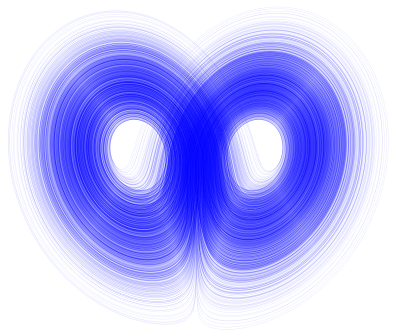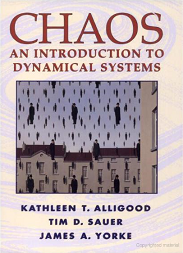
Dynamical Systems
I developed an upper-level dynamical systems course for Bard College which I taught on five occasions. This page contains information about this course.Summary
The course focused on discrete-time dynamical systems, fractal geometry, and complex dynamics. The preqrequisite was Bard's Linear Algebra with Ordinary Differential Equations course, and the audience for the course was a mix of sophomores, juniors, and seniors majoring in mathematics, physics, computer science, and economics. The course took a very computational and experimental approach to the subject, and students spent much of their time exploring dynamical systems in Mathematica.The textbook for the course was Chaos: An Introduction to Dynamical Systems, by Alligoood, Sauer, and Yorke.
Homework Assignments
Here are the weekly homework assignments for the course, which were worth 50% of the course grade. These assignments are a mixture of problem-solving, formal proofs, and computer analysis. Students were encouraged to work together on the homework but were required to write up their own solutions individually in LaTeX or Mathematica.- Homework 1 (Iteration, Orbits, Attracting Cycles)
- Homework 2 (The Logistic Family)
- Homework 3 (The Tent Map, Itineraries)
- Homework 4 (Two-Dimensional Maps, Strange Attractors, Double Pendulum)
- Homework 5 (Stability of Fixed Points in Two Dimensions, Stable and Unstable Manifolds)
- Homework 6 (Topological Conjugacy)
- Homework 7 (Transition Graphs, Tree Maps, Torus Maps)
- Homework 8 (Self-Similar Curves)
- Homework 9 (Space-Filling Curves)
- Homework 10 (Iterated Function Systems, Box-Counting Dimension)
Takehome Exams
There were two takehome exams for the course. The takehome midterm was worth 20% of the grade, and the takehome final was worth 15%.Notes
Though the course used a textbook, I supplemented this with notes on complex dynamics, including Julia sets and the Mandelbrot set:Syllabus
Here is the syllabus from the last time I taught the course. Textbook Information
Textbook Information
The textbook is Chaos: An Introduction to Dynamical Systems, by Alligoood, Sauer, and Yorke. You will need a copy of the textbook for reading and homework problems, though you do not need to bring it to class. The book is currently available for $62 from Amazon.com. You can also buy a PDF of the textbook from the publisher for $50.
Course Description
A dynamical system is any system whose state changes according to some fixed rule. The concept includes both continuous systems governed by differential equations and discrete-time systems described by an iterated function. This course will focus on dynamical systems that exhibit chaotic behavior. We will explore the source of chaos in discrete and continuous systems, as well as the transition to chaos in systems whose behavior depends on an external parameter. Topics to be covered include one-dimensional maps, discrete and continuous dynamics in multiple dimensions, chaotic attractors, fractals, and fractal dimension. We will end with an introduction to complex dynamics, including an exploration of Julia sets and and the Mandelbrot set.The prerequisite is Math 213 (Linear Algebra with ODE's) or the equivalent. The course will also assume some familiarity with computer programming, and many of the homework assignments will involve simple programming in Mathematica.
Homework, Exams, and Grading
Homework
Homework assignments will be a mixture of problem-solving, formal proofs, and computer analysis. You are encouraged to work together on the homework, especially if you don't have prior experience with using computers in math courses. However, you should write up your own solutions individually, and you must acknowledge any collaborators.All homework assignments must be written in LaTeX or Mathematica and submitted to me by e-mail.
Final Project
There will be a final project, on a topic of your choice. I am happy to allow group projects, though each member of a group must contribute as much effort as a student working individually. A typical project for a pair of students might consist of a 10 minute class presentation, a significant Mathematica notebook, and a 2–4 page written report. More details on the final project will be given as we approach the end of the semester.Exams and Grading
The grade will be based on the weekly homework, the takehome midterm exam, the takehome final exam, and the final project:| Homework | 50% |
| Midterm Exam | 20% |
| Final Exam | 15% |
| Final Project | 15% |
Project Information
Part of the requirements for this class include a final project. Here is some basic information about the project:- • Though individual projects are allowed, I would prefer for you to work together in groups of two or three.
- • The project must involve a short in-class computer presentation, of the following length:
- • Individual Project: 4–5 minute presentation
- • Two-Person Project: 8–10 minute presentation
- • Three-Person Project: 12–15 minute presentation
- • The project must also involve:
- • A Mathematica notebook, roughly as long and complicated as the solution to a homework assignment, and
- • A short typed paper, describing how your notebook works and the mathematics behind it.
Project Topics
In general, good topics include:- • An implementation of any one application of dynamical systems. For example, you could implement something that you find in any one journal article you find that uses dynamical systems or fractals.
- • Any Mathematica notebook that incorporates real-world data.
- • Any exploration of a dynamical systems of fractal geometry topic not covered in the course. Good topics include L-systems, cellular automata, Newton's Method, bifurcation theory, chaos in differential equations (see chapter 7 of the text), the stability test and Lyapunov exponents for continuous-time systems, time series and recurrence plots, dynamics on the torus and Arnold's cat map, invariant measures, Sharkovskii's Theorem, Lyapunov numbers for two-dimensional maps, correlation dimension, and so forth.
- • Any exploration or simulation of a real-world system with interesting dynamics. Possibilities include a three-body or n-body gravitation system, the double pendulum, the Lorenz system (and Lorenz attractor), Chua's circuit, Brownian motion, chaos in financial markets, and so forth
- • Any Mathematica notebook related to material in the course that we have not already implemented on the homework assignments. For example:
- A program for the tent map that automatically computes the list of periodic itineraries for each period, as well as the corresponding periodic points.
- A program that computes a random fractal analogous to the Sierpinski gasket (removing one of the four triangles at each stage).
- A program that automatically computes the transition graph for a given piecewise-linear function, and computes the point corresponding to any given itinerary.
- A program that draws the stable and unstable manifolds for a given hyperbolic fixed point.